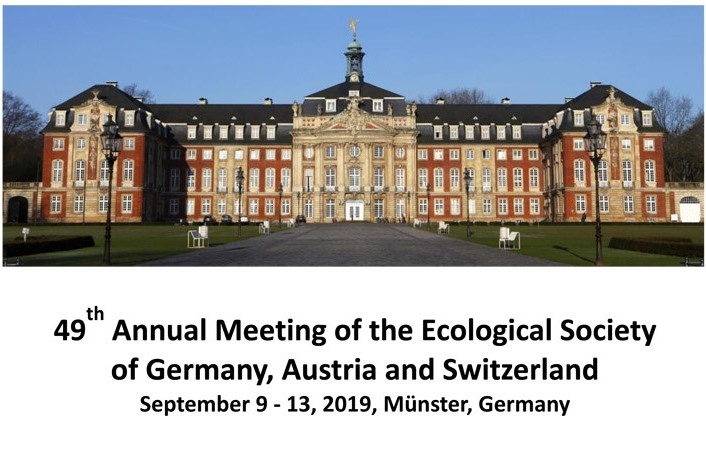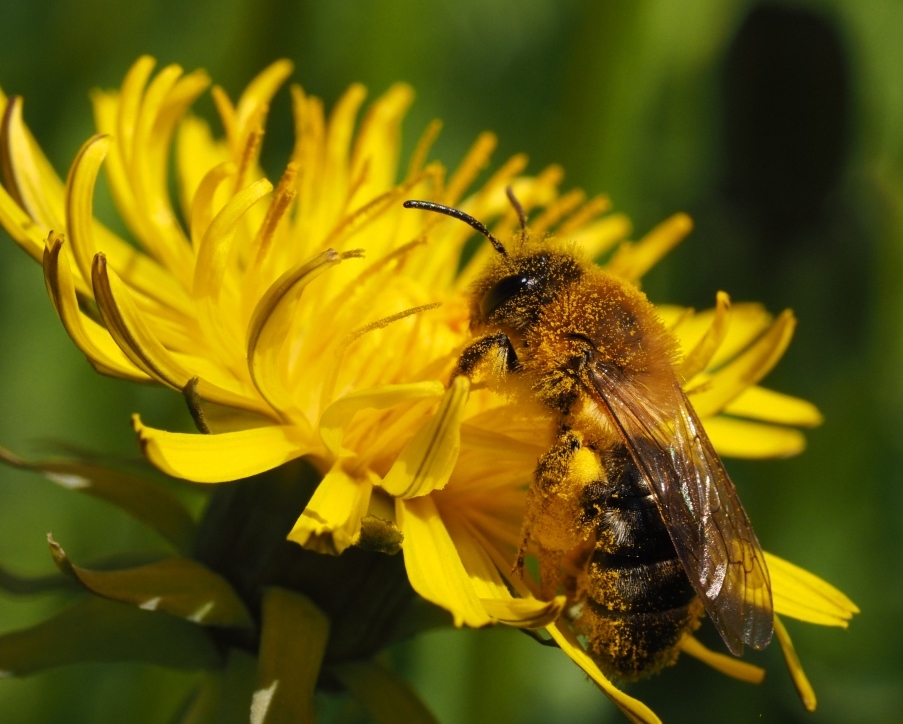2019
Dr. Michael Staab is one of three Freiburg Researchers of the University of Freiburg who was accepted into the | |
British Ecological Societyphotography competition 2019 “Capturing Ecology“ | |
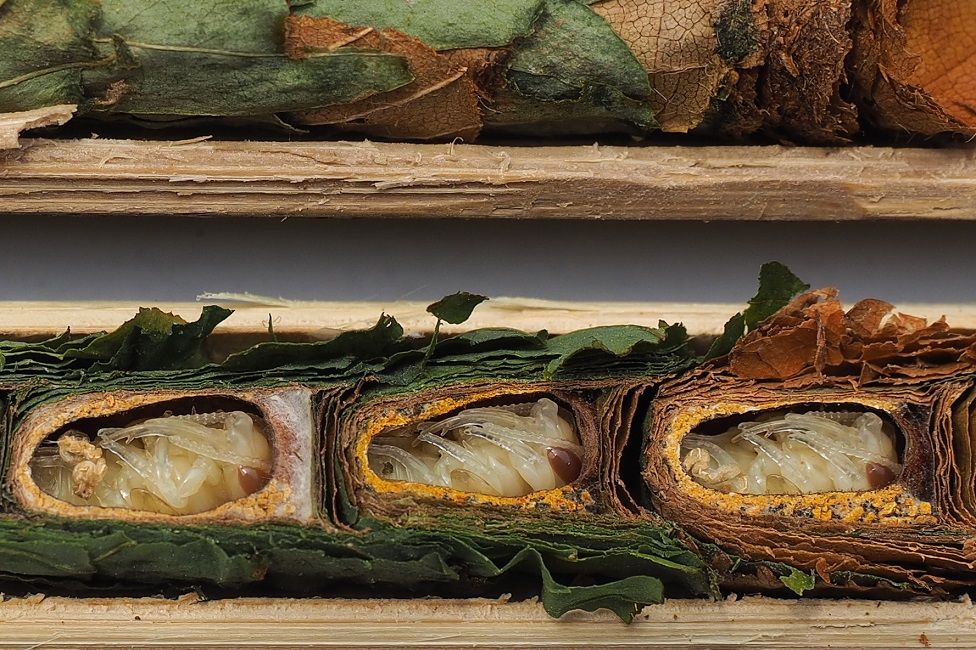 | |
Sleeping still "Leafcutter bee (Megachile) offspring develop in nests made from ovate leaf cuttings thoroughly arranged in multiple buffering layers by their mother bees. "The pigmentation of the pupas' eyes indicates the approaching end of metamorphoses and the arrival of the spring of their lives." |
Beirat der Landesregierung BW für nachhaltige Entwicklung Mitglied im Ressort Wissenschaft: Prof. Alexandra-Maria Klein |
Prof. Alexandra-Maria Klein 20.11.2019 one of the "Seven influential voices" of the University of Freiburg in the ranking of the web of Science | |
Interview mit Vivien von Königslöw zum Projekt "Hecken in Apfelplantagen"
30.10.2019 Beitrag von uniCros |
| "Pestizide weg, Flure begrünen – und dann? Um die „Bienen-Keule“ Neonikotinoide tobt ein Streit. Doch die Abschaffung macht noch keine weitsichtige Agrarpolitik. Was es sonst noch braucht." mit Beiträgen von Prof. Alexandra-Maria Klein |
Vortrag Prof. Alexandra-Maria Klein Montag, 21. Oktober, um 19:00 in den Räumen der Museumsgesellschaft Freiburg e.V. |
Vielfalt als Lebensprinzip Festlicher Akademietag mit Verleihung des Bad Herrenalber Akademiepreises an Prof. Alexandra-Maria Klein Sonntag 20.10.2019, 10:30 Bad Herrenalb, Haus der Kirche - Evangelische Akademie | 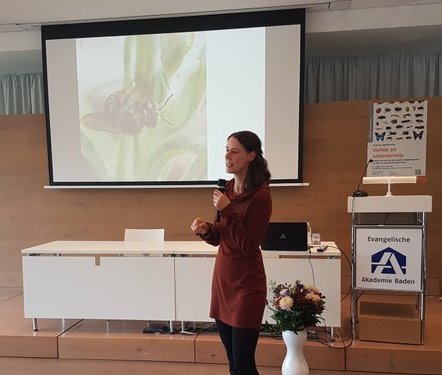 |
Badische Zeitung am 25.09.2019 "Volksbegehren "Rettet die Bienen": Wie radikal darf Artenschutz sein | |
| im Podium: Prof. Alexandra-Maria Klein Johannes Enssle Stefan Leichenauer Manfred Kraft Hansjörg Stücklin Moderation: Holger Knöferl 25.09.2019 im Friedrichsbau Kaiser-Joseph-Straße 268, Freiburg | 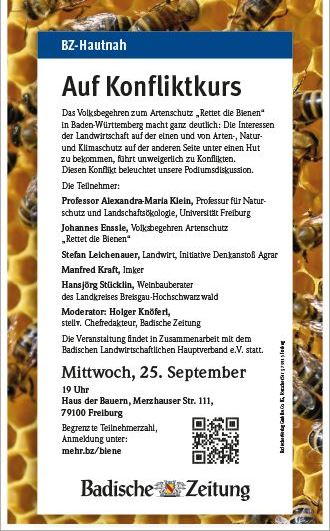 |
Badische Zeitung am 24.09.2019:
|
Current post: "Effects of pesticides on insects" from the media portalof the Freiburg University about our research projects: with other stressors on bees tested in semi-field and field experiments &
| |
At the 49th Annual meeting of the Ecological Society on 12.09.2019 Dr. Felix Fornoff & Prof. A.M. Klein Tobias Kellner & Eva M. Schüler (UWC - Freiburg) received the GfÖ project award for their common project:
| 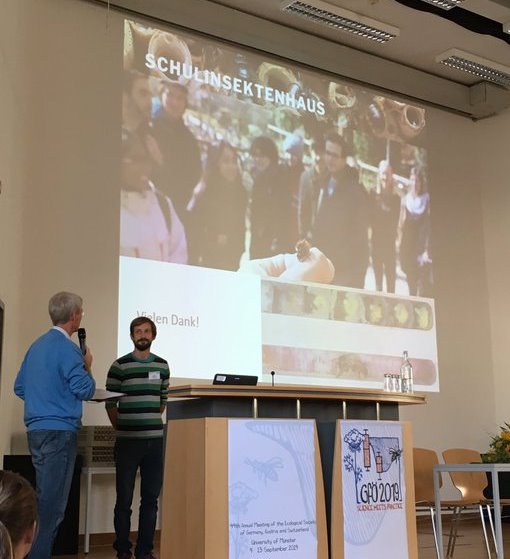 |
Symposium - Pollination & Flora with environmental change Prof. Alexandra-Maria Klein "The role of biodiversity and species interactions in agricultural landscapes and protected areas" | |
|
Talks: Eric Adjei Lawer, Alexandra-Maria Klein, Anne-Christine Mupepele Session 7-O3 - Conservation & restoration Small-scale disturbance regimes alter small mammal communities in a tropical West African forest.
Vivien von Königslöw, Alexandra-Maria Klein Session 8-O5 - Naturschutzpraxis trifft Wissenschaft Förderung von Bienen in Apfelplantagen durch naturnahe Vegetationsstrukturen.
Giovanni Tamburini, Riccardo Bommarco, Thomas Cherico Wanger, Claire Kremen, Marcel G.A. van der Heijden, Matt Liebman, Sara Hallin Session 19-O4 - Enticing farmers for ecological intensification Agricultural diversification supports biodiversity and multiple ecosystem services without compromising yields.
Riho Marja, Eneli Viik, Marika Mänd, James Phillips, Alexandra-Maria Klein, Péter Batáry Session 20-04 - Agrarecolgy Crop rotations determine bumblebee communities via flower resources.
Bernhard Eitzinger, Nerea Abrego, Dominique Gravel, Tea Huotari, Eero Vesterinen, Eoin O. Gorman, Tomas Roslin Session 24-10 - Molecular biodiversity & interaction assessment Metabarcoding of gut content indicates which factors shape predator-prey interactions along environmental gradients.
Maria Helena Pereira-Peixoto, Michael Staab, Alexandra-Maria Klein Session 31-O5 - Traits, networks, and ecosystem functioning Exotic garden plants substitute native plants as resources for pollinators when native plants become seasonally scarce without altering functional network structure.
Maria Georgi, Alexandra-Maria Klein, Stefanie Gärtner, Marc Förschler, Axel Ssymank, Yvonne Oelmann Session 32-O3 - European plant-pollinator communities Game meadows – a forgotten habitat for pollinator communities? Early mulching impairs hoverflies as key flower visitors on game meadows of the Black Forest.
Andreas Schuldt, Matthias Kunz, Michael Staab, Goddert von Oheimb, Jiayong Zhang, Helge Bruelheide, Nico Eisenhauer Session 40-O8 - Tree interactions affect ecosystem functioning Structural and functional diversity of tree communities drive arthropod diversity in subtropical forests Poster: Felix Fornoff, Alain Thill, Gita Benadi, Alexandra-Maria Klein Session 2-P8 - Urban ecosystems Effects of high frequency electromagnetic radiation on bee development and colony growth.
Anne-Christine Mupepele, Felix Fornoff Session 7-P4 - Conservation & restoration Relocation success of ground-nesting bees and wasps.
|
Prof. Alexandra-Maria Klein wurde am 25.07.2019 als Mitglied des Gründungsbeirats zur Forschungsinitiative zum Erhalt der Artenvielfalt berufen. | |
| Freitag 26.07.2019, 6:00 Interview mit Prof. Alexandra-Maria Klein "Ziele des Volksbegehrens "Rettet die Bienen" sind schwer zu erreichen anlässlich der geplanten Abgabe des Zulassungsantrags der Initiatoren für das Artenschutz-Volksbegehren "Rettet die Bienen!" in Baden-Württemberg. |
| Wissenschaftler sind alarmiert: "Der stumme Sommer. Warum sterben die Insekten?" Mittwoch 24.07.2019, 20:15 mit dabei: Prof. Alexandra-Maria Klein |
Agrikulturfestival Freiburg 2019 So 21.07.2019 12:00 "Krabbeltiere" Interview mit Prof. Alexandra-Maria Klein "Ursachenforschung zum und Maßnahmen gegen den Insektenschwund" Sa 20.07.2019 11:00 "Ziegen" Nicolas Schoof "Tiere zum Anfassen" |
Leopoldina-Nacht Artenvielfalt, Landwirtschaft und Künstliche Intelligenz – wie geht das zusammen? Debatte mit ExpertInnen: im Podium mit dabei: Prof. Alexandra-Maria Klein Freitag 05.07.2019, 21:00 - 22:30 Vortragssaal der Leopoldina, Jägerberg 1, 06108 Halle (Saale) |
| 06.06.2019 Interview mit Prof. Alexandra-Maria Klein zum "Masterplan Stadtnatur" - Maßnahmenprogramm der Bundesregierung für eine lebendige Stadt - |
| 17.05.2019 Was bringt es, wenn wir unsere Städte bienenfreundlich gestalten? Interview mit Prof. Alexandra-Maria Klein | 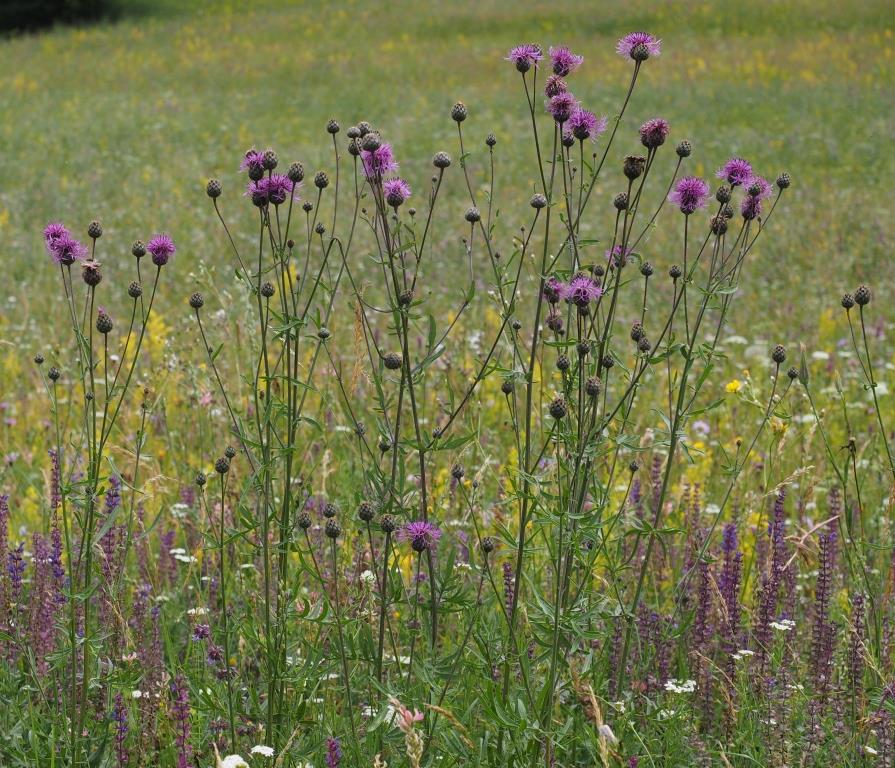 | 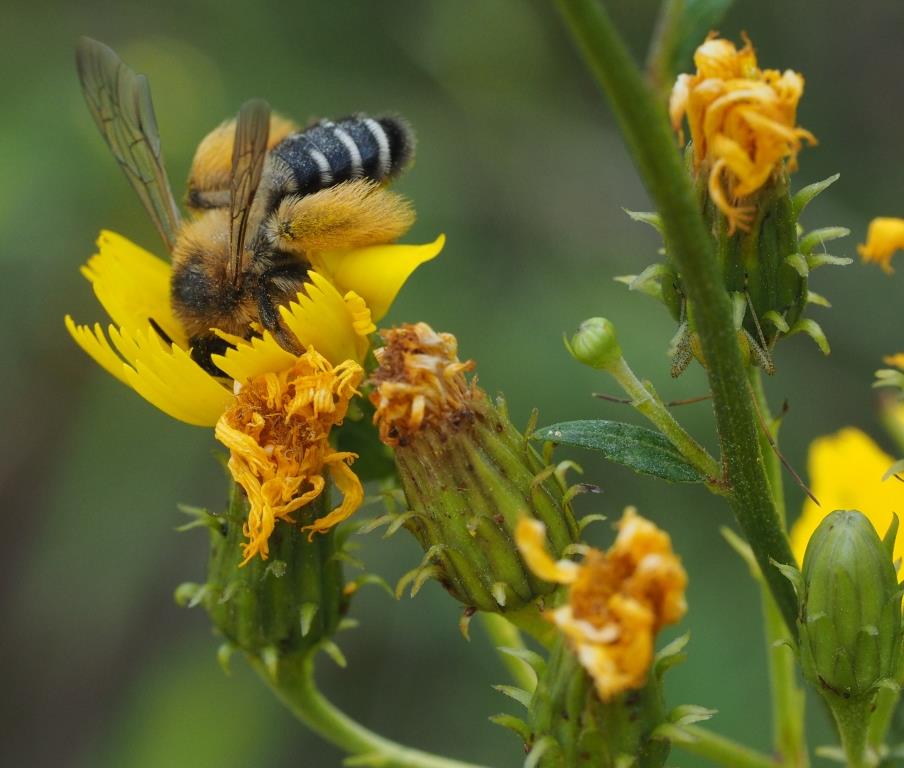 |
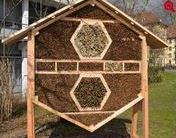 | ||
| 07.05.2019 Interview mit Prof. Alexandra-Maria Klein zum aktuellen Bericht des Weltbiodiversitätsrat IPBES (Intergovernmental Science-Policy Platform on Biodiversity and Ecosystem Services) zum Stand und Konsequenzen des Artensterbens. "Wir brauchen eine Transformation der Gesellschaft" |
| 05.05.2019 Trotz Gegenmaßnahmen halten Naturschutzexperten das Artensterben in der Region für dramatisch. mit einem Beitrag von Prof. Albert Reif |
| Prof. Alexandra-Maria Klein MSc. Vivien von Königslöw "Bienen zählen in Apfelanlagen" | 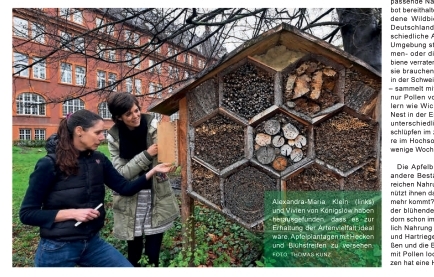 |
Prof. Alexandra-Maria Klein in der Dokumentation "Welt ohne Insekten" Das Insektensterben hält an. Eine fatale Entwicklung, rund 75 Prozent der Welternährung hängen von der Bestäubung der Insekten ab. Erneut schlägt der Weltbiodiversitätsrat Alarm. am So 05.05.2019 in der ZDF Reihe: planet e (Video verfügbar bis 01.05.2020) |
During the graduation ceremony of the Faculty of Forest Sciences and Forest Ecology of the Georg-August-University Göttingen Dr. Michael Staab on the 3rd of May 2019 honored with the "Ulrich-Award" | |
| Life Support - Teil 2, 30.04.2019 "How bugs put food on the table" "Once upon a time, bugs were seen as a threat to our food supply. We now know that they are the foundation of our ability to feed ourselves – and we’re killing them at an incredible rate". Interview with Prof. Alexandra-Maria Klein | |||
Unser Leben ohne (Wild-) Bienen? Dr. Felix Fornoff Vortrag am 15. April 2019 19:00 - 20:30 Palmengarten der Stadt Frankfurt am Main Siesmayersaal Eingang Siesmayerstraße 63 | |||
| Dr. Felix Fornoff Vortrag am 19. März 2019 im Dorfgasthof Bolando, Bollschweil im Rahmen der Veranstaltung des ZUKUNFT HEXENTAL e.V. Forum für Lebensqualität und Dorfentwicklung e.V.: "Insektensterben und was jeder Einzelne dagegen tun kann" |
| Biological diversity stabilizes species interactions Dr. Felix Fornoff, Dr. Michael Staab and Prof. Dr. Alexandra Maria Klein
Press Release Albert-Ludwigs-University Freiburg:
VBIO:Aktuelles aus den Biowissenschaften |
ARD / SWR - "PLANET WISSEN" Folge 489: - "Das große Insektensterben – was können wir tun?"
| |
Veranstaltungen im März 2019 mit Prof. Alexandra-Maria Klein
Dlf-Nova Podcast "Hörsaal": - Vortrag: "Bedrohte Vielfalt - Warum Biene und andere Insekten sterben" "Wild- und Honigbienen: Ihre Bedeutung und Zusammenspiel" NABU Kaiserstuhl, Alt-Vogtsburg s.a. Artikel der BZ am 26.03.2019 Link
07.03.2019 18:30-20:00 Vortrag und Diskusion "Insektensterben und Agroforst als Lösungsansatz" im Rahmen der Nachhaltigkeitswoche der Universität Bern |
| Prof. Alexandra-Maria Klein zur Forschungsinitiative "Erhalt der Artenvielfalt" am 27.02.2019:: „Wir müssen wieder mehr Vielfalt in die Landschaft bringen“ | |||
des Deutsch-Amerikanischen Instituts DAI, Heidelberg am 13.02.2019 u.a. mit Prof. Alexandra-Maria Klein "Natürlichkeit als Ideal" Was ist Wahn, was Wissenschaft? | |
31.01.2019: Hannah Miriam Sharaf successfully defended her dissertation entitled: "Vegetationsuntersuchungen in einem Agroforstsystem mit Wertholzproduktion: Analyse naturschutzfachlicher Potenziale verschiedener Einsaaten und Behandlungsmethoden sowie der Wechsel-wirkung zwischen Wertholz, Krautvegetation und landwirtschaftlich genutzten Flächen" in Freiburg. | 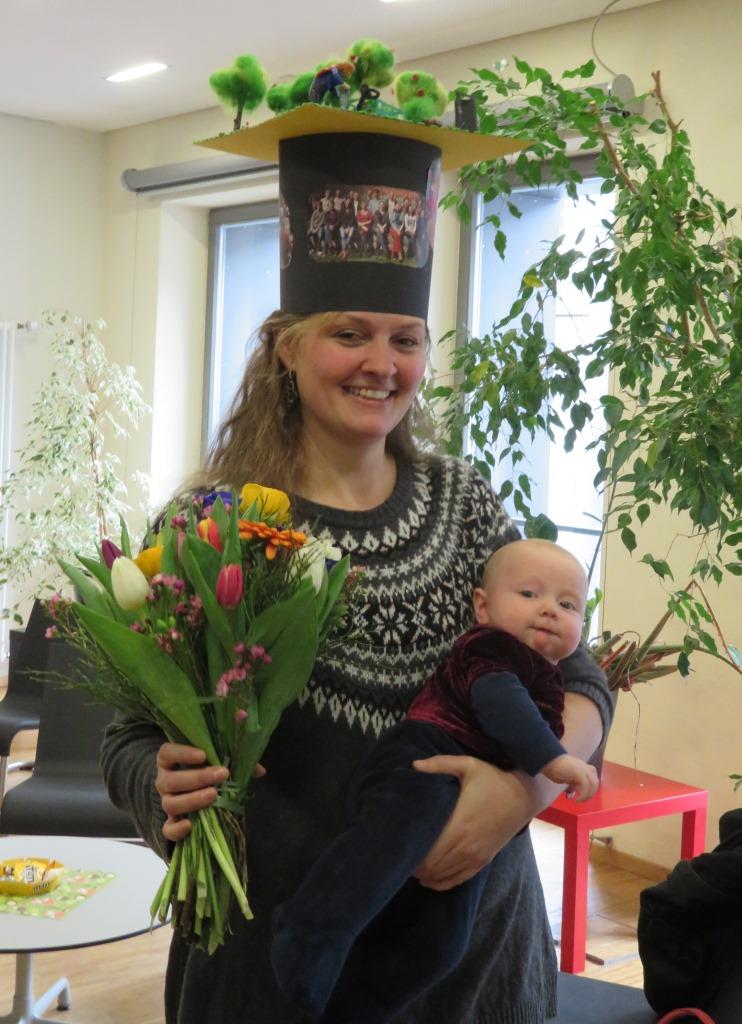 |
Klima-Festival: „Eco2Rives - grün und grenzenlos’’: - "Lemminge in Grönland und der Einfluss des Klimawandels" am 19.01.2019, 14.00 Stadthalle Kehl | |
Prof. Alexandra-Maria Klein wurde für die Amtsperiode 2018 - 2023 in folgende Gremien als Mitglied berufen: Stiftungsrat der Stiftung Naturschutzfonds beim Ministerium für Umwelt, Klima und Energiewirtschaft Fachausschuss für Naturschutzfragen | |

